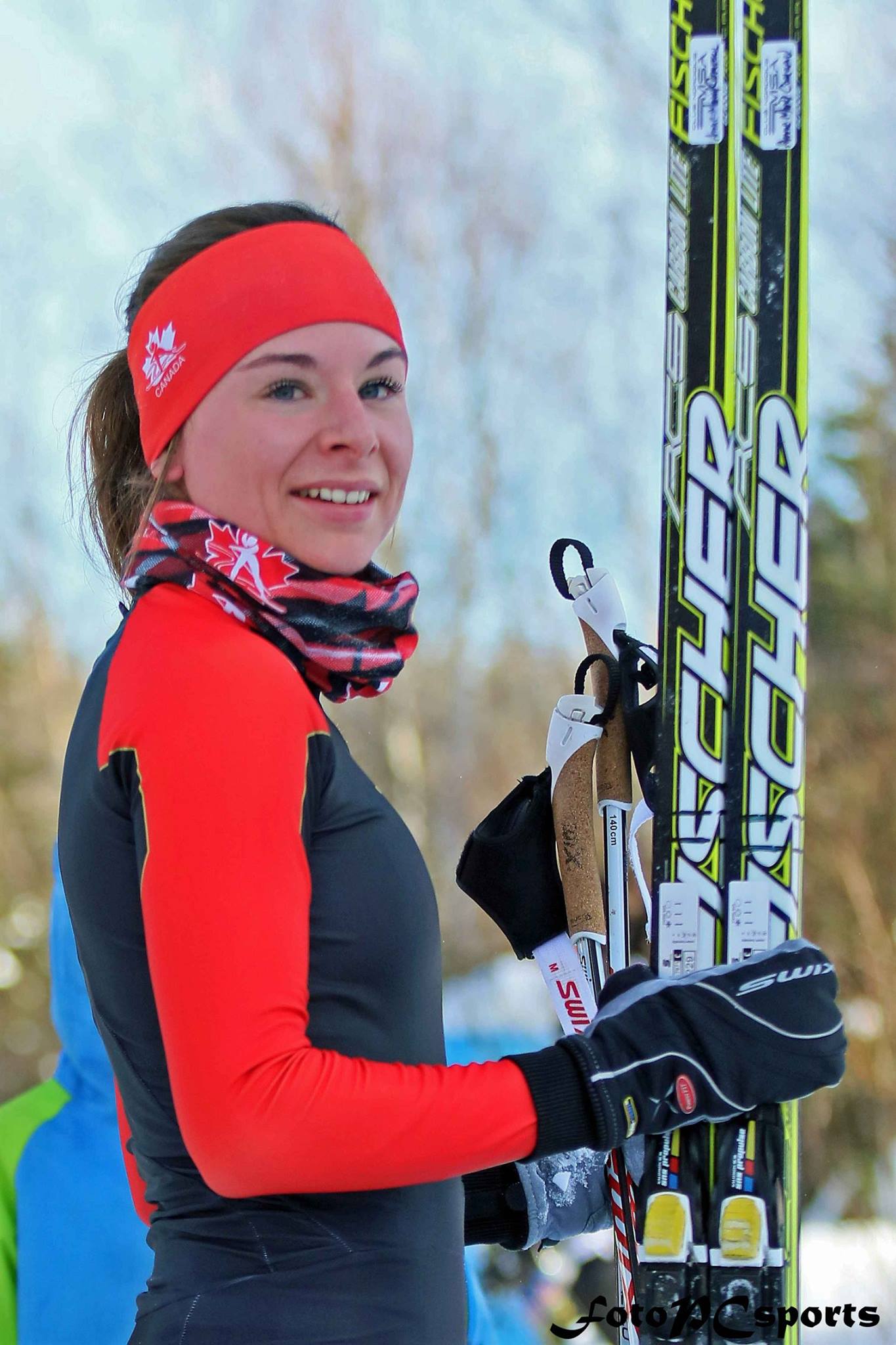
Today, she’s Olympic-bound. But two years ago, Anne-Marie Comeau was stepping away from cross-country skiing.
Comeau had raced at 2015 World Junior Championships, finishing 25th in the skiathlon, but by December of that year the Canadian was diagnosed with a shoulder injury that required her to take half a year away from skiing.
She didn’t compete past the first weekend of NorAms, or at all in the 2016-2017 season, after deciding to devote herself to running.

And that was plenty for Comeau to focus on. A talented runner, she had set the Quebec junior record at 5,000 meters (16:34.4, a time she has since improved on). And she won a silver medal at Junior Pan-American Games.
But skiing was something she couldn’t shake.
“I did more training for running, but skiing remained a sport that I love in the winter,” Comeau wrote in an interview with FasterSkier last week, translated from French into English. “I realized over the months that I missed ski racing, and so I decided in autumn of 2017 that I would do the selection races for Olympics, especially since they were at Mont-Ste-Anne where I live.”
So Comeau, who began attending Université Laval this fall and competed with their cross-country team, adapted her training somewhat. She added a rollerski workout once a week and uphill sessions on Mont Sainte Anne.
“Since it had been two years that I wasn’t doing ski races, it was difficult for me to come up with fixed goals,” Comeau wrote. “The prospect of participating in this type of selection gave me a certain motivation to train, and I couldn’t wait to get back to the joy of ski racing.”
At the same time, she was part of a college team for the first time.

“It’s always really stimulating to be part of a team where the other athletes have the same passion,” she wrote.
The Laval women won the Quebec Conference Championships, and finished third at Canadian U Sports Cross-Country Championships.
“I’m very satisfied with my first season,” Comeau wrote. “I’m particularly pleased with the result that I had when we participated in an NCAA race in Princeton, New Jersey. It was a 6 k cross-country race and our team finished second in the overall standings. I finished first in that race. That second place for our team gave us confidence for what came next. The atmosphere in the team was really good and I am always very proud to represent the Rouge et Or.”
The pride and team energy, combined with just enough ski-specific training, combined perfectly to prepare Comeau to re-enter the world of ski racing.
To say that the Olympic selection races went well would be an understatement. On the second day of racing Comeau placed second in the 15 k skiathlon behind Cendrine Browne, who had already sealed her Olympic nomination by winning the sprint to open the trials series. Then on the last day of competition Comeau placed third in the 10 k classic behind Browne and Katherine Stewart-Jones.
That made her the distance winner of the trials, not counting Browne.
“To succeed in qualifying for the Olympics was truly a huge joy for me and a motivation to give my best for what would follow!” she wrote.

But there was a catch: because Comeau hadn’t raced in so long – the only competitions she had done this season before selection trials were the Sovereign Lake NorAms – she did not have the required five FIS races averaging 100 points or below. So while she topped the selection list, in order to be allowed to race at the Olympics she had to get a few more results with good FIS points.
“After my races at Mont Sainte Anne, I was so motivated and proud of my results that it gave me positive energy to face the challenges that I had to overcome to meet the Olympic criteria from FIS,” Comeau wrote. “I didn’t really think about everything I had to accomplish, I just went right into it, the motivation of going to the Olympics being my main objective that I wanted to meet.”
To do that, she headed south, racing in a 10 k skate in Craftsbury, Vermont, and a 5 k classic in West Yellowstone, Montana. That brought her average FIS points down to 98.47.
Comeau is still absorbing the idea of becoming an Olympian.
“At 21 years old, I consider myself blessed to be able to live this experience, and I want to try to take the most of this experience to help me in the pursuit of my athletic career,” she wrote. “Honestly, to give the best I can and to live fully in each of my races, that’s my main goal. For the results, it’s hard for me to predict.”
Chelsea Little
Chelsea Little is FasterSkier's Editor-At-Large. A former racer at Ford Sayre, Dartmouth College and the Craftsbury Green Racing Project, she is a PhD candidate in aquatic ecology in the @Altermatt_lab at Eawag, the Swiss Federal Institute of Aquatic Science and Technology in Zurich, Switzerland. You can follow her on twitter @ChelskiLittle.



